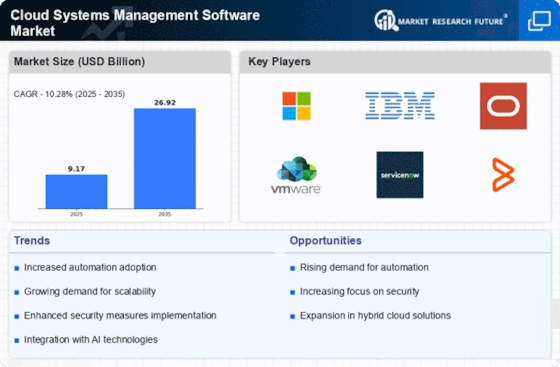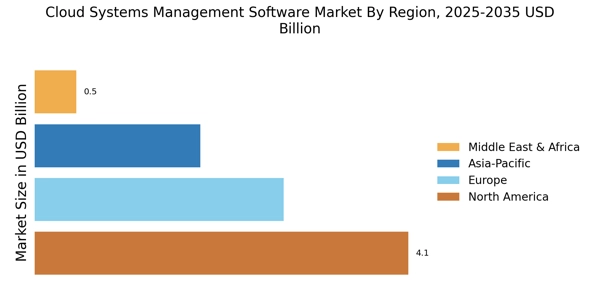Emphasis on Cost Efficiency
Cost efficiency remains a pivotal driver within the Cloud Systems Management Software Market. Organizations are increasingly adopting cloud solutions to reduce operational costs associated with traditional IT infrastructure. By leveraging cloud systems management software, businesses can optimize resource allocation, minimize downtime, and enhance overall productivity. Reports suggest that companies utilizing cloud management tools can achieve up to 30% savings in IT expenditures. This financial incentive encourages more enterprises to transition to cloud-based solutions, thereby stimulating growth in the Cloud Systems Management Software Market. As organizations continue to seek ways to streamline operations, the demand for cost-effective cloud management solutions is likely to rise.
Rising Demand for Scalability
The Cloud Systems Management Software Market experiences a notable surge in demand for scalable solutions. Organizations are increasingly seeking software that can adapt to their evolving needs, particularly as they expand their operations. This demand is driven by the necessity for businesses to manage growing data volumes and complex IT environments efficiently. According to recent estimates, the market for cloud systems management software is projected to reach USD 10 billion by 2026, reflecting a compound annual growth rate of approximately 15%. This growth indicates that companies are prioritizing flexibility and scalability in their IT strategies, thereby propelling the Cloud Systems Management Software Market forward.
Integration of Advanced Technologies
The integration of advanced technologies, such as artificial intelligence and machine learning, is transforming the Cloud Systems Management Software Market. These technologies enhance the capabilities of cloud management solutions, enabling predictive analytics, automated workflows, and improved decision-making processes. As organizations increasingly recognize the value of data-driven insights, the demand for cloud systems management software that incorporates these technologies is expected to grow. Analysts predict that the market will witness a significant uptick in adoption rates, with AI-driven solutions projected to account for over 25% of the market share by 2027. This trend underscores the importance of innovation in the Cloud Systems Management Software Market, as companies seek to leverage technology for competitive advantage.
Growing Complexity of IT Environments
The complexity of modern IT environments serves as a significant driver for the Cloud Systems Management Software Market. As organizations adopt multi-cloud and hybrid cloud strategies, managing diverse systems becomes increasingly challenging. This complexity necessitates robust management solutions that can provide visibility and control across various platforms. The market is responding to this need, with analysts projecting that the cloud systems management software sector will grow at a rate of 12% annually over the next five years. This growth reflects the urgent requirement for tools that can simplify management tasks and enhance operational efficiency, thereby reinforcing the Cloud Systems Management Software Market.
Increased Focus on Security and Compliance
Security and compliance concerns are paramount in the Cloud Systems Management Software Market. As data breaches and regulatory requirements become more prevalent, organizations are prioritizing solutions that ensure data protection and compliance with industry standards. The demand for cloud management software that incorporates advanced security features is on the rise, as businesses seek to mitigate risks associated with data handling. Recent surveys indicate that nearly 70% of organizations consider security a top priority when selecting cloud management solutions. This heightened focus on security is likely to drive innovation and investment in the Cloud Systems Management Software Market, as vendors strive to meet these critical needs.

















